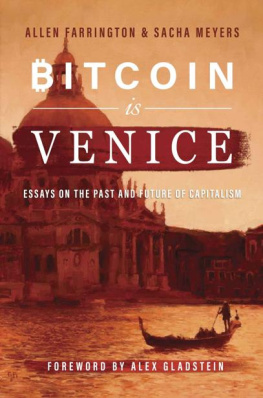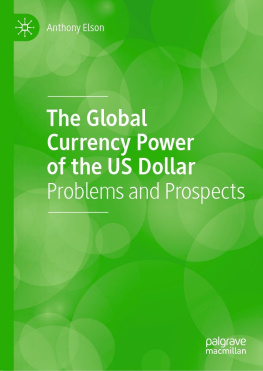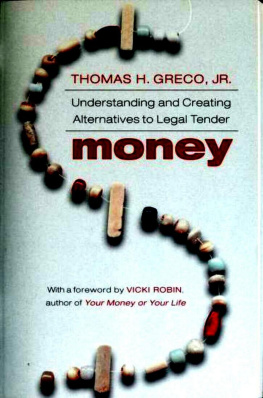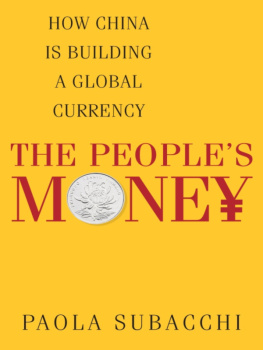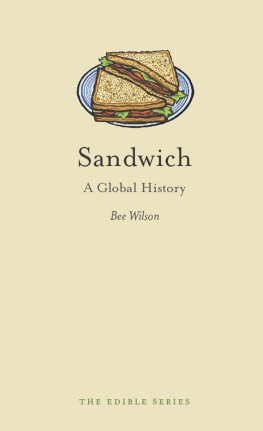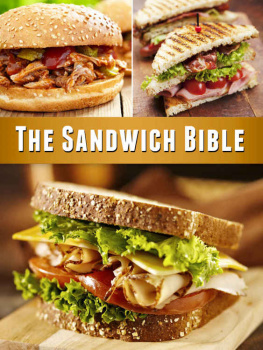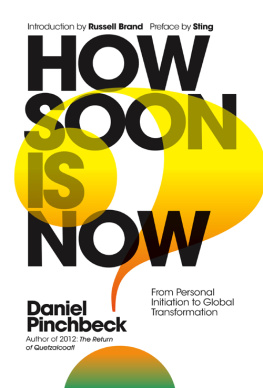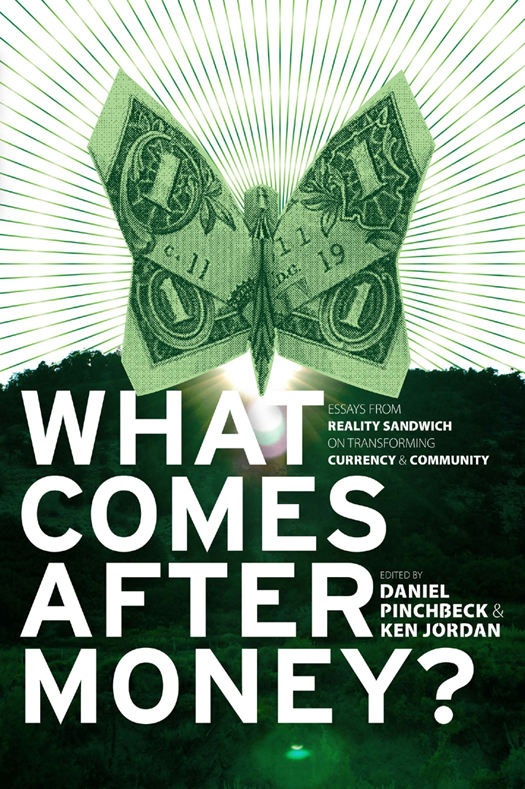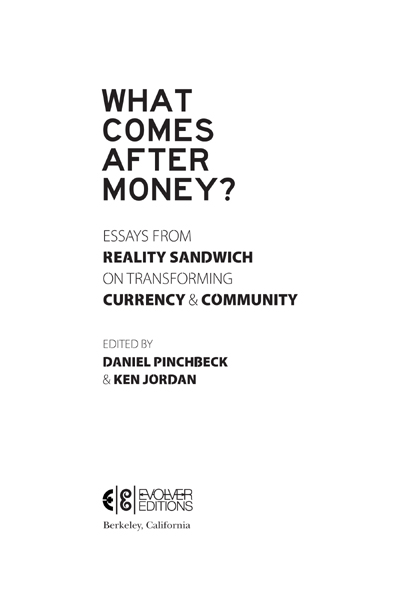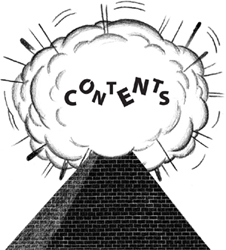Copyright 2011 by Daniel Pinchbeck and Ken Jordan. All rights reserved. No portion of this book, except for brief review, may be reproduced, stored in a retrieval system, or transmitted in any form or by any meanselectronic, mechanical, photocopying, recording, or otherwisewithout the written permission of the publisher. For information contact Evolver Editions c/o North Atlantic Books.
Published by Evolver Editions
Evolver Editions publications are distributed by
North Atlantic Books
P.O. Box 12327
Berkeley, California 94712
Art Direction, Design, and Photography by michaelrobinsonnyc.com
Illustrations on pages v and viii by Micah Lidberg
).
What Comes After Money? is sponsored by the Society for the Study of Native Arts and Sciences, a nonprofit educational corporation whose goals are to develop an educational and cross-cultural perspective linking various scientific, social, and artistic fields; to nurture a holistic view of arts, sciences, humanities, and healing; and to publish and distribute literature on the relationship of mind, body, and nature.
North Atlantic Books publications are available through most bookstores. For further information, visit our website at www.northatlanticbooks.com or call 800-733-3000.
Library of Congress Cataloging-in-Publication Data
What comes after money? : essays from Reality sandwich on transforming currency and community / edited by Daniel Pinchbeck and Ken Jordan.
p. cm.
Summary: A collection of twenty-two essays from the web magazine Reality Sandwich that discuss alternatives to the current systems of bank-financed currency and global capitalismProvided by publisher.
eISBN: 978-1-58394-350-2
1. Money. 2. Economic developmentSocial aspects. 3. Community development.
I. Pinchbeck, Daniel. II. Jordan, Ken. III. Reality sandwich.
HG221.W347 2011
332.4dc22
2011012690
v3.1
INTRODUCTION: THE IMPOSSIBLE ALTERNATIVE
DANIEL PINCHBECK
1. MONEY AND THE CRISIS OF CIVILIZATION
CHARLES EISENSTEIN
2. THE CAPITAL IS PERSONAL
ANYA KAMENETZ
3. THE ARITHMETIC OF COMPASSION
DAVID ULANSEY
4. PROGRAM YOUR OWN MONEY
DOUGLAS RUSHKOFF
5. MONEY AS A ZERO-SUM GAME
DALE PENDELL
!
6. ALL MY RELATIVES: THE BINARY FRACTALS OF THE GIFT ECONOMY
BARBARA ALICE MANN
7. THE TWILIGHT OF MONEY
JOHN MICHAEL GREER
8. CHANGE YOUR TIME ZONE, CHANGE YOUR MIND
ELLEN PEARLMAN
9. REINVENTING MONEY: AN ECOSYSTEMATIC APPROACH
BERNARD LIETAER, ROBERT ULANOWICZ & SALLY GOERNER
10. POVERTY (UN)CONSCIOUSNESS
ANTONIO LOPEZ
11. TIME BANKING IN SANTA FE
STELLA OSOROJOS
12. YOGA AND MONEY
SHARON GANNON
13. THE INTENTIONAL ECONOMY
DANIEL PINCHBECK
14. AN ARMY OF JACKS TO FIGHT THE POWER
PETER LAMBORN WILSON
15. ONE THOUSAND WORDS ABOUT WHERE FREE MUSIC IS TAKING US
PAUL D. MILLER, AKA DJ SPOOKY THAT SUBLIMINAL KID
$
16. I AM WE ARE IT IS
LARRY HARVEY
17. A FAREWELL TO ADVERTISING
KEN JORDAN
18. THE BNOTE: LOCAL CURRENCY FOR BALTIMORE
JEFF DICKEN AND MICHAEL TEW
19. IS GOD EXPENSIVE?
ELIEZER SOBEL
20. LOCAL CONTROL OF CREDIT: THE FOUNDATION OF ECONOMIC DEMOCRACY
THOMAS H. GRECO
21. A RETURN TO THE VALUE OF BEING HUMAN
HARDIN TIBBS
22. ORIGINAL WEALTH AND PEOPLES CAPITALISM
STEVE BHAERMAN
23. TOWARD A SPIRITUAL ECONOMICS
AMIT GOSWAMI
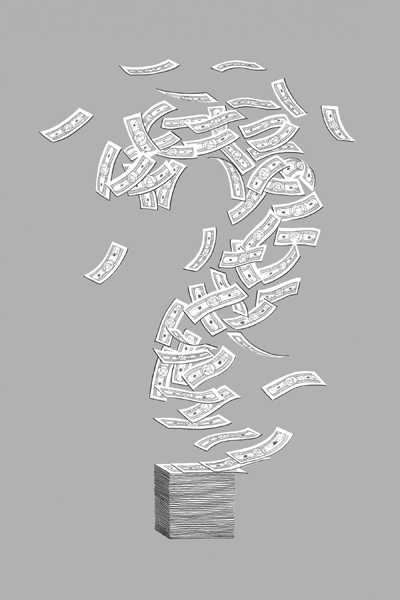
INTRODUCTION
THE IMPOSSIBLE ALTERNATIVE
DANIEL PINCHBECK
The money game We are all forced to play it, whether we like it or not. A few leap across the Monopoly board with great gusto, building or toppling companies, gobbling up futures on resources and minerals, speculating on currencies. Some market new cultural productsimages, memes, books, lines of software code, musical jinglesas their gambits and dice throws in the global casino. Others, dealt a worse hand, play a more brutal version of the game in the back alleys of third world cities, begging for baksheesh, selling their sex for a meager sum, sending their children to work in factories or collect bits of nickel and aluminum from toxic trash heaps. Simply by virtue of being born into this single global system, this omni-oppressive world order, we are all conscripted into a relentless contest, a ceaseless tumult.
Ever since the mangling of his ideas led to horrific dictatorships and genocidal regimes over the last century, the philosopher Karl Marx has been out of fashion, neglected and suppressed. This is understandable but unfortunate, as many of his insights into the mythic dimensions of money and the workings of capital deserve reconsideration. In the Economic and Philosophic Manuscripts of 1844, Marx describes money as the visible divinity in our capitalist world: By possessing the property of buying everything, by possessing the property of appropriating all objects, money is thus the object of eminent possession. The universality of its property is the omnipotence of its being. It therefore functions as almighty being. Money is the pimp between mans need and the object, between his life and his means of life. But that which mediates my life for me, also mediates the existence of other people for me. For me it is the other person. Since birth, we have been trained like performing seals to accept the spiteful conjurors trick that transmutes any and all qualities into quantitiesinto bigger or smaller piles of cash. Seemingly without an alternative, most of us accept a system in which everything and everyone has its price, and beneath every celebration lies a cynical calculation.
Hypnotized by our culture, most people believe that our current form of money is the only rational way to exchange valuethat a debt-based currency, detached from any tangible asset, is something as organic and inevitable as carbon molecules, ice, or photosynthesis. We forget that money, in its current form, is just a tool. Humans created money to perform certain functions and satisfy certain needs. But just as engineers and computer programmers drop cruder, out-of-date tools and pick up better ones as soon as they become available, we might also switch to more sophisticated instruments for transferring goods and services that function more efficiently and equitably. We could implement new mechanisms and platforms for exchanging value that we have designed to prevent the destructive social and ecological feedback loops produced by our current financial system. As an operating system for society, money needs a major upgrade. This upgrade will not just happen on its own; we need to apply our intelligence and creativity to make it happen.


